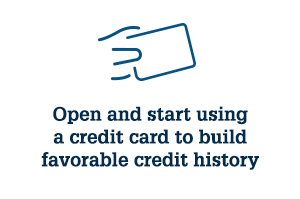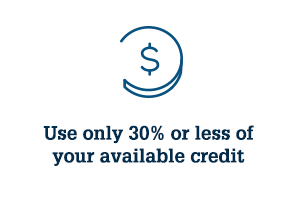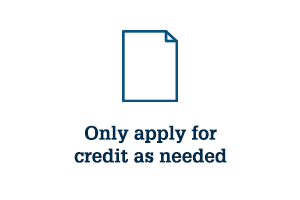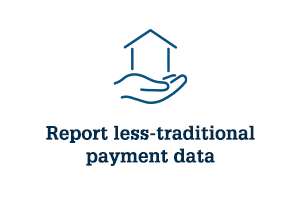Credit Basics
Using resources, tools, and other useful intel, you can level up your credit and take an important step towards reaching life’s big goals, like homeownership.
Let’s start by learning more about credit
Building good credit is like building a house. You start with a foundation – which, in this case, is your current credit score – and build from there. It’s all about how you spend the money you earn and how much debt you incur.
![]()
Why credit is important
The way your credit is gauged is through your credit score. The better your credit score, the more likely a creditor is to trust that you will pay them back. A strong credit history can help you towards your goal of homeownership.
![]()
How credit is reported
There are three primary national credit bureaus that monitor and report on your credit — Equifax, Experian, and TransUnion. Your credit score is one important factor towards becoming approved for a mortgage.
![]()
How credit impacts your ability to buy a home
Your credit score can affect where you qualify for a loan, as well as the type of loan and loan terms. You may still be approved for a mortgage with a lower credit score, but you may have to pay a higher interest rate.
Building your credit
As you set your foundation for building good credit, know it may take time, but it’s never too late to start. Set small, achievable goals and give yourself a big pat on the back each time you accomplish one. Here are some resources to get you started.
Credit score basics
Understanding my score
Your credit score is a number between 300 and 850 assigned to your credit based on feedback provided by creditors to any of three credit reporting bureaus. Your credit score rates your ability to pay depending on where it falls within the credit score range. A higher score can help you unlock savings and benefits through better interest rates and more favorable loan terms.
Finding my score
The three primary credit reporting bureaus – Equifax, Experian, and TransUnion – issue a credit report that reflects your financial history. Your report includes items such as:
- Your payment history
- Amount owed to creditors
- Available credit
- Types of accounts
- How long the accounts have been open
You can request these reports from each of the three primary credit reporting bureaus every 12 months for no charge as a way to track your score.
Pro tip!
Stagger when you check your credit report from each agency to monitor your credit throughout the year. Your score may vary depending on the credit scoring model used by each bureau.
Build a credit history
You can start building your credit by opening and using credit cards in moderation. If you don’t have a credit card, try applying for one from a department store or applying for a secured card from a bank—one that typically requires a cash security deposit. Keep in mind that these options usually have a lower balance limit and a higher interest rate, so you’ll want to use them in moderation and pay your bills on time. Showing consistent on-time payments will help you establish your credit history and strengthen your score.
By building and using credit responsibly, you’re helping establish a credit history that can be used to help you achieve your financial goals.
On-time payments matter
When you apply for credit such as a car loan, renting an apartment or house, or even a mortgage, the creditor will check your credit history. If you have consistently made your credit payments on time, the creditor will take that into account when evaluating you for a loan. This can make a difference in whether you are approved for the loan.
Credit usage
The amount of credit you use versus how much credit you have available is your credit utilization, a factor that impacts your credit score. Taking your total balance across all credit cards and dividing it by your total available card limits is your credit utilization ratio. You want to keep this ratio at less than 30% to build and keep a strong credit score.
Debt-to-income ratio
Debt-to-income (DTI) ratio is the amount you owe on all outstanding debts compared to your income before taxes and is shown as a percentage. A low percentage helps increase your access to new loans. Paying off existing debts and not incurring new debts help to lower this number. While your DTI may not impact your credit score, it is a key indicator lenders use to understand whether you can afford a mortgage payment.
Simple, easy steps to build your credit.
If you’ve ever borrowed money from a bank or taken out a loan for a car, you know that good credit is important. Give yourself credit for learning these steps to help you establish, build, and manage your credit. You deserve it.
Keep in mind that you should avoid maxing out your credit cards or carrying a balance from month to month, as much as you can. Paying on time can mean paying less on interest and can help improve your credit score.














